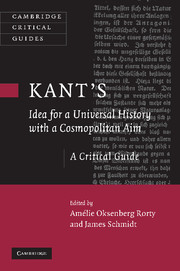Book contents
- Frontmatter
- Contents
- List of contributors
- List of abbreviations
- Introduction: history as philosophy
- Idea for a Universal History with a Cosmopolitan Aim
- 1 Teleology and history in Kant: the critical foundations of Kant's philosophy of history
- 2 The purposive development of human capacities
- 3 Reason as a species characteristic
- 4 Good out of evil: Kant and the idea of unsocial sociability
- 5 Kant's Fourth Proposition: the unsociable sociability of human nature
- 6 The crooked timber of mankind
- 7 A habitat for humanity
- 8 Kant's changing cosmopolitanism
- 9 The hidden plan of nature
- 10 Providence as progress: Kant's variations on a tale of origins
- 11 Norms, facts, and the philosophy of history
- 12 Philosophy helps history
- Bibliography
- Index of names and works
8 - Kant's changing cosmopolitanism
Published online by Cambridge University Press: 28 July 2009
- Frontmatter
- Contents
- List of contributors
- List of abbreviations
- Introduction: history as philosophy
- Idea for a Universal History with a Cosmopolitan Aim
- 1 Teleology and history in Kant: the critical foundations of Kant's philosophy of history
- 2 The purposive development of human capacities
- 3 Reason as a species characteristic
- 4 Good out of evil: Kant and the idea of unsocial sociability
- 5 Kant's Fourth Proposition: the unsociable sociability of human nature
- 6 The crooked timber of mankind
- 7 A habitat for humanity
- 8 Kant's changing cosmopolitanism
- 9 The hidden plan of nature
- 10 Providence as progress: Kant's variations on a tale of origins
- 11 Norms, facts, and the philosophy of history
- 12 Philosophy helps history
- Bibliography
- Index of names and works
Summary
In the Seventh Proposition of the Idea for a Universal History with a Cosmopolitan Aim, Kant advocates the establishment of a federation of states with coercive powers to enforce its laws. He states that a “cosmopolitan condition,” which such a worldwide federative body would create, is required for the security and stability of its member states. Their security and stability, in turn, are required in order to facilitate the complete development of the human predispositions for the use of reason, which Kant suggests is the final end of human history.
The ideal of an international federation of states returns many times in Kant's later writings, for instance, in the Critique of Judgment (1790), “On the Common Saying: That May Be True in Theory, But it is of No Use in Practice” (1793), The Contest of the Faculties (1798), and most notably in Toward Perpetual Peace: A Philosophical Sketch (1795) and the Metaphysics of Morals (1797). Compared to its formulation in the Idea, however, Kant's later texts introduce fundamental changes on a number of important points, although this usually goes unnoticed in the literature. In other words, the view formulated in the 1784 essay is Kant's early view, which he later modifies in important respects.
In this essay, I aim to explicate Kant's early cosmopolitan view as found in the Idea.
- Type
- Chapter
- Information
- Kant's Idea for a Universal History with a Cosmopolitan Aim , pp. 171 - 186Publisher: Cambridge University PressPrint publication year: 2009
- 22
- Cited by

